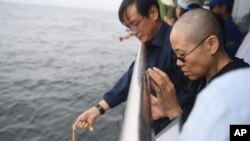On July 13th, Chinese dissident and political activist Liu Xiaobo died of liver cancer at the age of 61. He is the first Nobel Peace Laureate to die in custody since von Ossietzky’s death in Nazi Germany. With his passing, one of the world’s strongest voices in defense of human rights and democracy has been silenced.
Liu Xiaobo was a literary critic and writer, professor at Beijing Normal University and a guest lecturer at a number of universities outside of China. As an advocate for non-violent political reform, a multi-party political system, separation of powers, government accountability and a free market system, he eventually fell afoul of the Chinese government. He came to international prominence during the Tiananmen Square protests in 1989, first as a participant in a hunger strike, and later for his negotiations with China’s military forces that allowed hundreds of students to disperse peacefully, even as protestors in the surrounding streets were met with a bloody show of force.
Over the next 26 years, he was imprisoned four times on charges such as “instigating counterrevolutionary behavior,” “involvement in the democracy and human rights movement,” “disturbing the social order,” and “inciting the subversion of state power.” This last charge stemmed from co-authoring Charter 08, a manifesto modeled partly on Charter 77, which Czech dissidents drafted in 1977.
In 2010, while in prison, Liu Xiaobo was awarded the Nobel Peace Prize for his long and non-violent effort to advance human rights in China. Beijing authorities did not permit him to attend the ceremony, where he was represented by an empty chair.
“Mr. Liu dedicated his life to the betterment of his country and humankind, and to the pursuit of justice and liberty,” said Secretary of State Rex Tillerson in a written statement.
“In his fight for freedom, equality, and constitutional rule in China, Liu Xiaobo embodied the human spirit that the Nobel Prize rewards. In his death, he has only reaffirmed the Nobel Committee’s selection.”
Liu Xia, Liu Xiaobo's beloved wife, who has been under house arrest and whose own well-being and freedoms are now a concern of the United States government and broader international community, once said that “One day, even if he's not regarded as a hero, he'll be thought of as a very good citizen.”
Liu Xiaobo was, indeed, a very good citizen.














